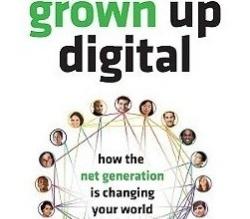According to generational lines, I am one year removed from being part of the “Net Generation” (the 81.1 million people born January 1977-December 1997). Yet as I read Grown Up Digital, the follow-up to the 1997 work Growing Up Digital, I discovered even this small gap has left me with much to learn about the shifts currently taking place in society.
It can be easy to reduce generational divides to simplistic stereotypes; but author Don Tapscott resists this temptation, instead taking a rigorous approach in an attempt “to sort out what is true, what is false, and what is unknown” about this emerging generation. Through his work as a University of Toronto adjunct professor of management and observations as a Baby Boomer parent of Net Gener’s, Tapscott insightfully identifies and explains eight norms of the “Net” age group. These include: freedom, customization, scrutiny, integrity, collaboration, entertainment, speed and innovation. He then tracks the norms using studies, charts, graphs and compelling individual stories to flesh out their impact on areas such as education, the workplace, consumerism, family life and politics.
What Tapscott uncovers may surprise those who have bought into many of the popular doom and gloom predictions about today’s youth. His findings, such as how this age group is transforming education from a passive broadcast model to an interactive learning process, lead him to the hopeful conclusion that “not only are the kids all right, but as a generation they are poised to transform every institution of society–for the better.”
The result of Tapscott’s thorough synthesis and analysis is an informative tool that should gain close attention from parents, educators, marketers, managers, youth pastors and volunteers seeking to move beyond “NGenophobia” (the irrational fear of youth) in order to ask, “Will we have the courage to accept them, their culture and their media?”




